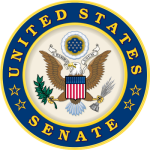- 업종: Government
- Number of terms: 4127
- Number of blossaries: 0
- Company Profile:
The United States Senate is the upper house of the United States Congress. The composition and powers of the Senate are established in Article One of the U.S. Constitution. Each U.S. state is represented by two senators, regardless of population. Senators serve staggered six-year terms.
Informal term for any attempt to block or delay Senate action on a bill or other matter by debating it at length, by offering numerous procedural motions, or by any other delaying or obstructive actions.
Industry:Government
A temporary, ad hoc panel composed of House and Senate conferees which is formed for the purpose of reconciling differences in legislation that has passed both chambers. Conference committees are usually convened to resolve bicameral differences on major and controversial legislation.
Industry:Government
An informal practice by which a Senator informs his or her floor leader that he or she does not wish a particular bill or other measure to reach the floor for consideration. The Majority Leader need not follow the Senator's wishes, but is on notice that the opposing Senator may filibuster any motion to proceed to consider the measure.
Industry:Government
A meeting of a committee or subcommittee -- generally open to the public -- to take testimony in order to gather information and opinions on proposed legislation, to conduct an investigation, or review the operation or other aspects of a Federal agency or program.
Industry:Government
Projection of the receipts, outlays, and other budget amounts that would ensue in the future without any change in existing policy. Baseline projections are used to gauge the extent to which proposed legislation, if enacted into law, would alter current spending and revenue levels.
Industry:Government
Nominations and treaties; called executive business because these categories of business are received by the Senate from the President, rather than introduced by Senators.
Industry:Government
The minority leader is elected by his/her party conferences to serve as the chief Senate spokesmen for their party and to manage and schedule the legislative and executive business of the Senate. By custom, the Presiding Officer gives the floor leaders priority in obtaining recognition to speak on the floor of the Senate.
Industry:Government
The provision of funds, through an annual appropriations act or a permanent law, for federal agencies to make payments out of the Treasury for specified purposes. The formal federal spending process consists of two sequential steps: authorization and then appropriation. Legislation status tables and information about the appropriations process are available on the Appropriations page.
Industry:Government
The Majority Leader and Minority Leader are elected by their respective party conferences to serve as the chief Senate spokesmen for their parties and to manage and schedule the legislative and executive business of the Senate. By custom, the Presiding Officer gives the floor leaders priority in obtaining recognition to speak on the floor of the Senate.
Industry:Government
A call of the roll to establish whether a quorum is present. If any Senator "suggests the absence of a quorum," the Presiding Officer must direct the roll to be called. Often, a quorum call is terminated by unanimous consent before completion, which permits the Senate to use the quorum call to obtain a brief delay to work out some difficulty or await a Senator's arrival.
Industry:Government
